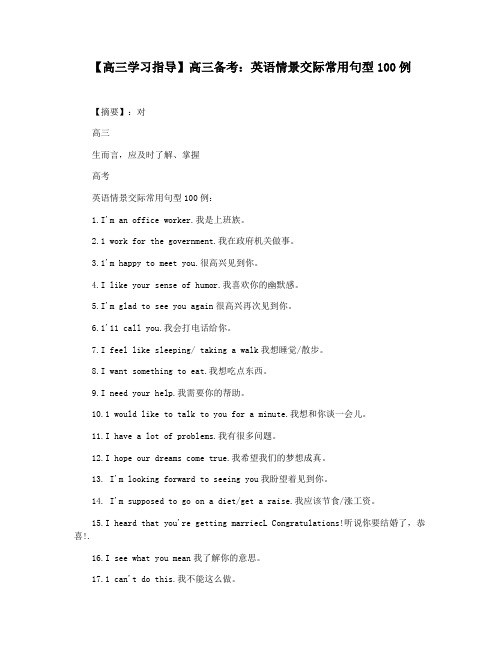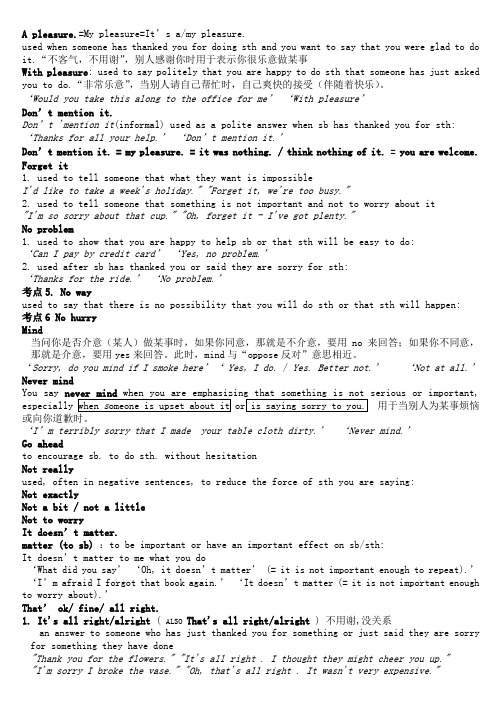【精品】高中常见的情景交际用语
- 格式:pdf
- 大小:16.59 KB
- 文档页数:3

高中英语情景交际总结及练习1.回答对方感谢(Thanks)—Thank you!—It’s a pleasure./My pleasure./Don’t mention it./That’s all right./You are welcome. 2.回答对方道歉(Apologies)—Sorry.—Never mind./It doesn’t matter./It’s all right./Forget it./That’s all right.3.回答对方请求—Can I.../Could I.../Would you mind if I...—1)Yes, please./Sure./Certainly./Of course./Please do./Of course, you can./Go ahead, please.—2)I am sorry; it’s not allowed./I’m afraid not./You’d better not./I’d rather you didn’t.4.回答对方提供帮助—Would you like me to help...—1)Yes, please./That’s very kind of you./Thank you. That would be nice./Thank you for your help.—2)No, thanks./Thank you all the same./It’s very kind of you, but I can manage it myself.5.表示同意和不同意—1)Sure./certainly./Exactly./Absolutely./That’s correct./Of course./All right.(好的)/I agree./I can’t agree more./That’s a good idea./Yes, I think so./ That’s exactly what I was thinking./That’s just how I see it.—2)No way./Of course not./I’m afraid I don’t agree./I don’t think so./Well, it depends./Well, I am not sure about it.6.几个常见的短语:1.So do I. “So+助动词+主语”表述前面一种表肯定意义的情况也适合后面的另一个人,意为“某人也一样”。


【高三学习指导】高三备考:英语情景交际常用句型100例【摘要】:对高三生而言,应及时了解、掌握高考英语情景交际常用句型100例:1.I'm an office worker.我是上班族。
2.1 work for the government.我在政府机关做事。
3.1'm happy to meet you.很高兴见到你。
4.I like your sense of humor.我喜欢你的幽默感。
5.I'm glad to see you again很高兴再次见到你。
6.1'11 call you.我会打电话给你。
7.I feel like sleeping/ taking a walk我想睡觉/散步。
8.I want something to eat.我想吃点东西。
9.I need your help.我需要你的帮助。
10.1 would like to talk to you for a minute.我想和你谈一会儿。
11.I have a lot of problems.我有很多问题。
12.I hope our dreams come true.我希望我们的梦想成真。
13. I'm looking forward to seeing you我盼望着见到你。
14. I'm supposed to go on a diet/get a raise.我应该节食/涨工资。
15.I heard that you're getting marriecL Congratulations!听说你要结婚了,恭喜!.16.I see what you mean我了解你的意思。
17.1 can't do this.我不能这么做。
18. Let me explain why l was late.让我解释迟到的理由。
19. I.et,s have a beer or something.咱们喝点啤酒什么的。

A pleasure.=My pleasure=It’s a/my pleasure.used when someone has thanked you for doing sth and you want to say that you were glad to do it.“不客气,不用谢”,别人感谢你时用于表示你很乐意做某事With pleasure: used to say politely that you are happy to do sth that someone has just asked you to do.“非常乐意”,当别人请自己帮忙时,自己爽快的接受(伴随着快乐)。
‘W ould you take this along to the office for me’ ‘With pleasure’Don’t mention it.Don’t 'mention it(informal) used as a polite answer when sb has thanked you for sth:‘Thanks for all your help.’ ‘Don’t mention it.’Don’t mention it. = my pleasure. = it was nothing. / think nothing of it. = you are welcome. Forget it1. used to tell someone that what they want is impossibleI'd like to take a week's holiday." "Forget it, we're too busy."2. used to tell someone that something is not important and not to worry about it"I'm so sorry about that cup." "Oh, forget it - I've got plenty."No problem1. used to show that you are happy to help sb or that sth will be easy to do:‘Can I pay by credit card’ ‘Yes, no problem.’2. used after sb has thanked you or said they are sorry for sth:‘Thanks for the ride.’ ‘No problem.’考点5. No wayused to say that there is no possibility that you will do sth or that sth will happen:考点6 No hurryMind当问你是否介意(某人)做某事时,如果你同意,那就是不介意,要用no 来回答;如果你不同意,那就是介意,要用yes来回答。

高中英语情景交际总结及练习1.回答对方感谢(Thanks)—Thank you!—It’s a pleasure./My pleasure./Don’t mention it./That’s all right./You are welcome. 2.回答对方道歉(Apologies)—Sorry.—Never mind./It doesn’t matter./It’s all right./Forget it./That’s all right.3.回答对方请求—Can I.../Could I.../Would you mind if I...—1)Yes, please./Sure./Certainly./Of course./Please do./Of course, you can./Go ahead, please.—2)I am sorry; it’s not allowed./I’m afraid not./You’d better not./I’d rather you didn’t.4.回答对方提供帮助—Would you like me to help...—1)Yes, please./That’s very kind of you./Thank you. That would be nice./Thank you for your help.—2)No, thanks./Thank you all the same./It’s very kind of you, but I can manage it myself.5.表示同意和不同意—1)Sure./certainly./Exactly./Absolutely./That’s correct./Of course./All right.(好的)/I agree./I can’t agree more./That’s a good idea./Yes, I think so./ That’s exactly what I was thinking./That’s just how I see it.—2)No way./Of course not./I’m afraid I don’t agree./I don’t think so./Well, it depends./Well, I am not sure about it.6.几个常见的短语:1.So do I. “So+助动词+主语”表述前面一种表肯定意义的情况也适合后面的另一个人,意为“某人也一样”。

盘点情景交际用语————————————————————————————————作者: ————————————————————————————————日期:ﻩ盘点情景交际用语高考中的情景交际题是在特定的语言环境中考查考生运用语言的能力,但由于受到中西方文化不同思维方式的影响,或只单纯地考虑语法规则而忽视礼貌得体原则,结果往往选错答案。
结合较历年高考试题,将常见的情景交际用语归纳如下:一、“没关系;不要紧;没问题;别提了…”类⒈Never mind意为“没关系;不要紧;不用费事”,常用于以下几种场合:1)当别人向你致歉时;2)请对方放心或安慰对方时注意:由于受字面意思的影响,很多学生把Never mind用于对Do\Would you mind…的否定回答。
对Do\Would you mind…表示“不介意”时常用No,notat all;ofcourse not;certainly not;No, please;No,go ahead等;表示“介意”的回答为Youhad better not;You’drather not;I’mafraid…not;I’m sorry,but…等。
⒉Forget it 意为“没关系;不要紧;别提了”,通常用于以下场合:1)当别人向你致歉时;2)不同意对方要求的委婉拒绝⒊No problem意为“没问题;成”。
通常用于对别人的请求表示同意。
类似的表达还有:All right;OK。
⒋Itdoesn’t matter相当于No matter,意为“没关系;不要紧”,通常用于对别人道歉的答语。
高考链接:①-----Wouldyou mindmy coming and having a look at yournewgarden?Mylittleson’scuriousabout roses you grow。
-----_______。
You’re welcome。
高考常考五类情景交际用语总结一、“没关系;不要紧;没问题;别提了…”类⒈ Never mind意为“没关系;不要紧;不用费事”,常用于以下几种场合:1)当别人向你致歉时;2)请对方放心或安慰对方时注意:由于受字面意思的影响,很多学生把Never mind用于对Do\Would you mind…的否定回答。
对Do\Would you mind…表示“不介意”时常用No, not at all;of course not;certainly not;No, please;No,go ahead等;表示“介意”的回答为You had better not;You’d rather not;I’m afraid…not;I’m sorry,but…等。
⒉Forget it 意为“没关系;不要紧;别提了”,通常用于以下场合:1)当别人向你致歉时;2)不同意对方要求的委婉拒绝⒊No problem意为“没问题;成”。
通常用于对别人的请求表示同意。
类似的表达还有:All right;OK。
⒋It doesn’t matter相当于No matter,意为“没关系;不要紧”,通常用于对别人道歉的答语。
二、pleasure类⒈It’s a pleasure to do …意为“很高兴做…”,相当于Pleased\Nice\Glad to do。
⒉It’s a pleasure=A pleasure=My pleasure,意为“不用谢;没关系;这是我乐意做的”,通常是对thank you 的回答。
⒊With pleasure=Yes\Certainly,意为“当然可以;愿意效劳”。
类似的答语还有:All right;OK;No problem;I’d like to等,主要用于对别人的请求表示乐意去做的场合。
三、all right 类⒈That’s all right意为“不用谢;没关系”,主要用于对感谢或歉意的礼貌回答。
英语情景交际常用语在日常英语交际生活中,一些简单常用的语句会帮助我们交流更加顺利,下面店铺就带大家一起来看看英语情景交际常用语吧。
英语情景交际常用语1一、打电话(Makingphonecalls)1、请给某人/某单位打电话。
Would/could/canyouringup?请你打电话好吧?句中ringup意思是"给某人打电话"。
除了用ringup外,还可用call,callup,telephone等,意思相同。
canyou?用得最普通;could/wouldyou.?用在正式场合,比较礼貌。
2、电话拨不通时常说:Thelineisbusy.Ican'tgetthrough.电话占线,我打不通。
/I'lltryagainlater.我过一会儿再打。
其中line指电话线路,getthrough指接通电话。
3、电话拨通后相互打招呼:Hello,(nameortelephonenumber)你好,(并通报本人的姓名或单位名称或电话号码)Hello,isth at……speaking?你是……吗?/Whoisthatspeaking/calling?你是谁?/Whoisspeaking/calling,please?你是谁?应答时常说:Yes,(thisis)speaking.是的,我是……。
/Yes,it's.here.我是。
4、打电话请对方找人或留言:Is……in/athome?某某在家吗?/Can/may/couldIspeakto……,please?请……接电话好吗?/Will/wouldyougiveamessageto……,please?请给……捎个口信好吗?/Wouldyoutellhimmytelephonenumber,please?请你把我的电话号码告诉他好吗?/Can/couldyouask……toringmeback,please?请叫……给我回个电话好吗?应答时常说:Holdon/Waitaminute/Onemoment,please.请等一等。
高中英语情景交际总结及练习1.回答对方感谢(Thanks)—Thank you!—It’s a pleasure./My pleasure./Don’t mention it./That’s all right./You are welcome. 2.回答对方道歉(Apologies)—Sorry.—Never mind./It doesn’t matter./It’s all right./Forget it./That’s all right.3.回答对方请求—Can I.../Could I.../Would you mind if I...—1)Yes, please./Sure./Certainly./Of course./Please do./Of course, you can./Go ahead, please.—2)I am sorry; it’s not allowed./I’m afraid not./You’d better not./I’d rather you didn’t.4.回答对方提供帮助—Would you like me to help...—1)Yes, please./That’s very kind of you./Thank you. That would be nice./Thank you for your help.—2)No, thanks./Thank you all the same./It’s very kind of you, but I can manage it myself.5.表示同意和不同意—1)Sure./certainly./Exactly./Absolutely./That’s correct./Of course./All right.(好的)/I agree./I can’t agree more./That’s a good idea./Yes, I think so./ That’s exactly what I was thinking./That’s just how I see it.—2)No way./Of course not./I’m afraid I don’t agree./I don’t think so./Well, it depends./Well, I am not sure about it.6.几个常见的短语:1.So do I. “So+助动词+主语”表述前面一种表肯定意义的情况也适合后面的另一个人,意为“某人也一样”。
A pleasure.=My pleasure=It?s a/my pleasure.used when someone has thanked you for doing sth and you want to say that you were glad to do it.“不客气,不用谢”,别人感谢你时用于表示你很乐意做某事With pleasure: used to say politely that you are happy to do sth that someone has just asked you to do.“非常乐意”,当别人请自己帮忙时,自己爽快的接受(伴随着快乐)。
‘Would you take this along to the office for me?’‘With pleasure’Don’t mention it.Don’t 'mention it(informal) used as a polite answer when sb has thanked you for sth:‘Thanks for all your help.’‘Don’t mention it.’Don’t mention it. = my pleasure. = it was nothing. / think nothing of it. = you are welcome.Forget it1. used to tell someone that what they want is impossibleI'd like to take a week's holiday." "Forget it, we're too busy."2. used to tell someone that something is not important and not to worry about it"I'm so sorry about that cup." "Oh, forget it - I've got plenty."No problem1. used to show that you are happy to help sb or that sth will be easy to do:‘Can I pay by credit card?’‘Yes, no problem.’2. used after sb has thanked you or said they are sorry for sth:‘Thanks for the ride.’‘No problem.’考点5. No wayused to say that there is no possibility that you will do sth or that sth will happen:考点6 No hurryMind当问你是否介意(某人)做某事时,如果你同意,那就是不介意,要用no 来回答;如果你不同意,那就是介意,要用yes来回答。
此时,mind与“oppose反对”意思相近。
. / Yes. Better not.’‘Not at all.’,Sorry, do you mind if I smoke here?’‘ Yes, I doNever mindYou say never mind when you are emphasizing that something is not serious or important, especially when someone is upset about it or is saying sorry to you. 用于当别人为某事烦恼或向你道歉时。
‘Never mind.’‘I’m terribly sorry that I made your table cloth dirty.’Go aheadto encourage sb. to do sth. without hesitationNot reallyused, often in negative sentences, to reduce the force of sth you are saying:Not exactlyNot a bit / not a littleNot to worryIt doesn’t matter.matter (to sb):to be important or have an important effect on sb/sth:It doesn?t matter to me what you do,What did you say?? ,Oh, it doesn?t matter? (= it is not important enough to repeat).?,I?m afraid I forgot that book again.? ,It doesn?t matter (= it is not important enough to worry about).?That’ ok/ fine/ all right.1. It's all right/alright ( ALSO That's all right/alright ) 不用谢,没关系an answer to someone who has just thanked you for something or just said they are sorry for somethingthey have done"Thank you for the flowers." "It's all right . I thought they might cheer you up.""I'm sorry I broke the vase." "Oh, that's all right . It wasn't very expensive."1.If you say that someone or something is all right, you mean that you find them satisfactory or acceptable.Is it all right with you if we go now?...Take your time: to use as much time as you need without hurrying: 不急,慢慢来Take it easy:used to tell sb not to be worried or angry: 别担心,别生气How do you find…有时how do you find sth. ?是问你觉得某物怎么样,同What do you think of….? How do you like..?Why not? 和isn’t it?used to express agreement.用来表示同意某建议或想法,并不是问“为什么不可以?”。
“Why not ”is联系:有些反意疑问句也并不是表示疑问,而是一种习惯,一种语气,如:A: It?s fine, isn?t it? B:yes, it is, isn?t it?Why not do something? 表建议做某事;why do something做某事没有必要Thank you按照英语的习惯,别人赞美奉承自己时,应表示感谢,而不是中国式的谦虚。
I’m sorry/ I hate to say this, but…It doesn’t hurt to askNot at all1. used as a polite reply after someone has thanked you "Thanks for helping." "Not at all."2. used to say 'no' or 'not' strongly "Was he a nuisance?" "No, not at all." I'm not at all happy about it. Help yourself.to give something to someone or to take something for yourself : help在这里是“拿、取”之意,多用于食物,也可用于其它东西。
"Might I have some more bread?" "Please, help yourself !"Come one on 近义于NOT BELIEVEinformal , used to tell someone that you do not believe them or that you disagree with them, or to show thatyou are angry with them 得了吧。
(表示不相信,不同意或生气)Oh come on, Ian, you made the same excuse last week!2. come on phrasal verb HURRYsaid to encourage someone to do something, especially to hurry or try harder, or to tell you something 快点,加油,Come on - we're going to be late if you don't hurry!Come on, Annabelle, you can tell me. I won't tell anyone.It’s up to you.What’s up?So what?used to mean 'it's not important' and 'I don't care' 那又怎样?How come?used to ask how or why something has happened especially when you are surprised by it= what is the explanation of…?“怎么回事?怎么搞的?为什么?怎么会这样?”通常用在你觉得奇怪而问为什么的时候。